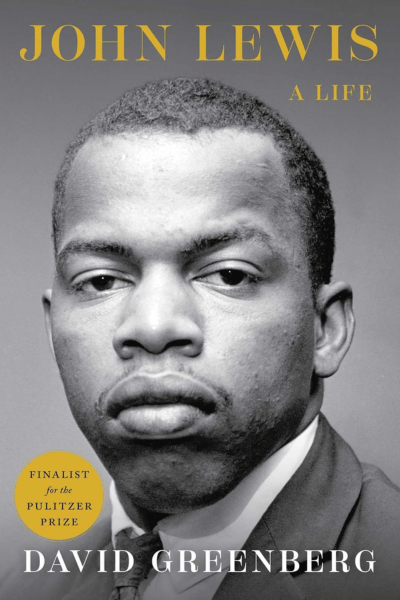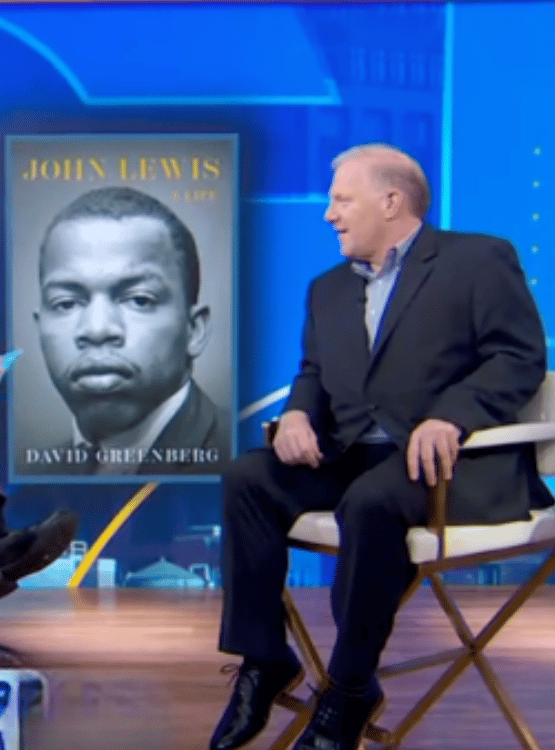 “Panoramic and richly insightful. … Greenberg makes us privy to the alchemy that transformed a shy Alabama farm boy into a central voice of the movement that drove a dagger into the heart of Jim Crow. This biography sets a new standard by giving Lewis’s post-civil-rights story the depth of attention it deserve.” — Brent Staples, front-page review, The New York Times Book Review
“Panoramic and richly insightful. … Greenberg makes us privy to the alchemy that transformed a shy Alabama farm boy into a central voice of the movement that drove a dagger into the heart of Jim Crow. This biography sets a new standard by giving Lewis’s post-civil-rights story the depth of attention it deserve.” — Brent Staples, front-page review, The New York Times Book Review
 “A work of art … David Greenberg has brought to life not only one unusual man but also the tumultuous racial history of our country. … Read every word of this superb book.” — The Arts Fuse
“A work of art … David Greenberg has brought to life not only one unusual man but also the tumultuous racial history of our country. … Read every word of this superb book.” — The Arts Fuse
 “Lewis’s biography unfolds as a danger-filled, coming-of-age adventure chronicled in sweeping detail by David Greenberg in his exceptional, tremendous biography.” — Jeff Calder, The Atlanta Journal-Constitution
“Lewis’s biography unfolds as a danger-filled, coming-of-age adventure chronicled in sweeping detail by David Greenberg in his exceptional, tremendous biography.” — Jeff Calder, The Atlanta Journal-Constitution
 “A passionately researched and defining portrait of an American hero. … Greenberg captures Lewis’ life, achievements, and times with heart-stopping precision.” — Lesley Williams, Booklist
“A passionately researched and defining portrait of an American hero. … Greenberg captures Lewis’ life, achievements, and times with heart-stopping precision.” — Lesley Williams, Booklist
 “The brilliance of David Greenberg’s biography is that it not only captures Lewis’ life and legacy, but firmly uncovers how the larger trends in American social, cultural, intellectual, and political history can be seen through the life of one man. Like the best of biographies, John Lewis: A Life is not just about the subject of the biography, but also the world in which he lived.” — Robert Greene II, Society for U.S. Intellectual History
“The brilliance of David Greenberg’s biography is that it not only captures Lewis’ life and legacy, but firmly uncovers how the larger trends in American social, cultural, intellectual, and political history can be seen through the life of one man. Like the best of biographies, John Lewis: A Life is not just about the subject of the biography, but also the world in which he lived.” — Robert Greene II, Society for U.S. Intellectual History
 “Greenberg is a terrific storyteller, with a ginger touch and a falcon eye for the brilliant detail, which makes his book an education and an engrossing read. Republic of Spin is surely the definitive book on a definitively American subject: the making and manipulation of public opinion.” — Christopher Buckley, National Interest
“Greenberg is a terrific storyteller, with a ginger touch and a falcon eye for the brilliant detail, which makes his book an education and an engrossing read. Republic of Spin is surely the definitive book on a definitively American subject: the making and manipulation of public opinion.” — Christopher Buckley, National Interest
 “From William McKinley to Barack Obama, a prizewinning historian looks at the tortured marriage of public relations and the modern presidency. …At once scholarly, imaginative, and great fun.” — Kirkus Reviews
“From William McKinley to Barack Obama, a prizewinning historian looks at the tortured marriage of public relations and the modern presidency. …At once scholarly, imaginative, and great fun.” — Kirkus Reviews
 “There are many fascinating revelations in this smoothly written book … a series of epiphanies. Republic of Spin is alternately fascinating, horrifying, and thought provoking.” — Alex Beam, Yale Alumni Magazine
“There are many fascinating revelations in this smoothly written book … a series of epiphanies. Republic of Spin is alternately fascinating, horrifying, and thought provoking.” — Alex Beam, Yale Alumni Magazine
 “Greenberg is a fluid, authoritative writer. … In Republic of Spin, [he] offers a … panoramic view, examining a century of White House news management and image-making and the broader history of political spin.” — Columbia Journalism Review
“Greenberg is a fluid, authoritative writer. … In Republic of Spin, [he] offers a … panoramic view, examining a century of White House news management and image-making and the broader history of political spin.” — Columbia Journalism Review
 “Greenberg has written an insightful, extensive account of the image-making entailed in the modern American presidency. …This revealing account of politics as image in U.S. presidential culture should be read by any student of the American presidency and American politics.” — Library Journal
“Greenberg has written an insightful, extensive account of the image-making entailed in the modern American presidency. …This revealing account of politics as image in U.S. presidential culture should be read by any student of the American presidency and American politics.” — Library Journal
 “Greenberg has done more than provide us with a new understanding of the 37th president. He has produced a work that consistently challenges much of the received wisdom about how politics works. Indeed, I am hard pressed to think of a book on politics as bracing and original as this one. … he has produced a strikingly compelling portrait of one of American politics’ most fascinating figures. In the process, he has shaped a treasure trove of insights about how politics really works. This is not just the debut of a highly promising thinker, but also a work that has already fulfilled that promise.” — Jeff Greenfield, The Washington Monthly
“Greenberg has done more than provide us with a new understanding of the 37th president. He has produced a work that consistently challenges much of the received wisdom about how politics works. Indeed, I am hard pressed to think of a book on politics as bracing and original as this one. … he has produced a strikingly compelling portrait of one of American politics’ most fascinating figures. In the process, he has shaped a treasure trove of insights about how politics really works. This is not just the debut of a highly promising thinker, but also a work that has already fulfilled that promise.” — Jeff Greenfield, The Washington Monthly
 “A vibrant account of Richard Nixon as a cultural icon—the first book on this subject. Greenberg’s social history reveals Nixon’s complex personas as no chronological biography has done.” — Library Journal
“A vibrant account of Richard Nixon as a cultural icon—the first book on this subject. Greenberg’s social history reveals Nixon’s complex personas as no chronological biography has done.” — Library Journal
 “Am enthralling, compulsively readable book. … Digging into a plethora of sources, including print archives, biographies, newsreels, movies, plays, songs and cartoons, Greenberg turns the image of Nixon around like a many-sided jewel, seeing how the light shines differently through each facet.” — Jay Parini, The Guardian
“Am enthralling, compulsively readable book. … Digging into a plethora of sources, including print archives, biographies, newsreels, movies, plays, songs and cartoons, Greenberg turns the image of Nixon around like a many-sided jewel, seeing how the light shines differently through each facet.” — Jay Parini, The Guardian
 “In Nixon’s Shadow, Greenberg traces meaning from such incidents as deftly as an astronomer charts the cosmos from the apparent movement of the stars and planets. Exhaustively researched and fluently written, this book, his first, is an important contribution to the study of Richard Nixon, and provides a penetrating analysis of how the president’s legacy has altered American politics irrevocably.” — Jonathan Keats, Christian Science Monitor
“In Nixon’s Shadow, Greenberg traces meaning from such incidents as deftly as an astronomer charts the cosmos from the apparent movement of the stars and planets. Exhaustively researched and fluently written, this book, his first, is an important contribution to the study of Richard Nixon, and provides a penetrating analysis of how the president’s legacy has altered American politics irrevocably.” — Jonathan Keats, Christian Science Monitor
 “Greenberg creates a brilliant picture of the political culture in the United States and a penetrating portrait of its most controversial president. Nobody before has written so informatively about this man and his time.” — Bernd Greiner, Die Zeit
“Greenberg creates a brilliant picture of the political culture in the United States and a penetrating portrait of its most controversial president. Nobody before has written so informatively about this man and his time.” — Bernd Greiner, Die Zeit



